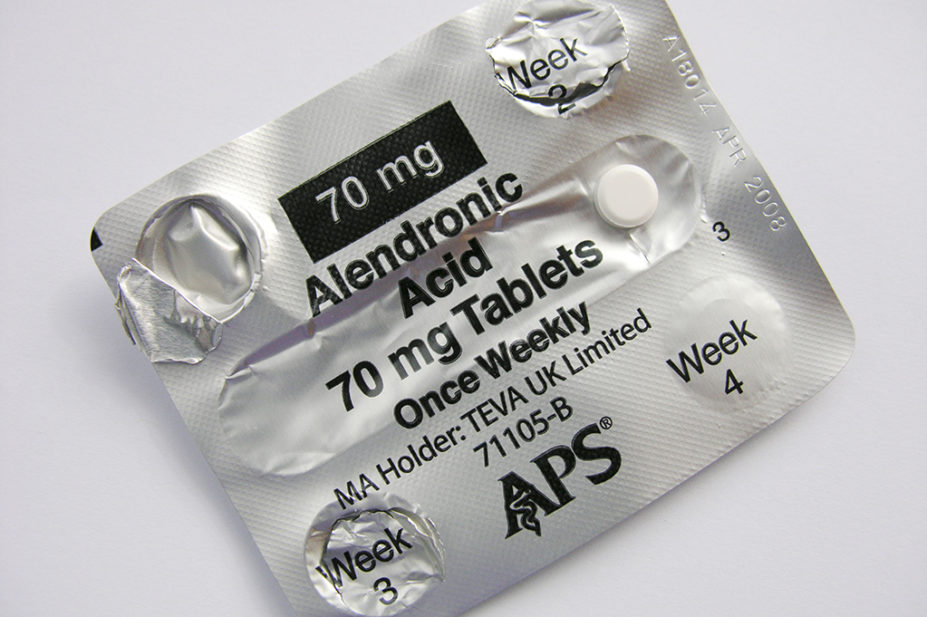
Libby Welch / Alamy Stock Photo
Shortages of the osteoperosis medicine alendronic acid are affecting patient care and contributing to medication errors, pharmacists have told The Pharmaceutical Journal.
On 14 July 2022, the Department of Health and Social Care (DHSC) issued a medicine supply notification warning that alendronic acid 70mg tablets were out of stock until “late August 2022” and advised clinicians to “consider prescribing” risedronate 35mg once-weekly tablets or ibandronic acid 150mg once-monthly tablets instead.
Alendronic acid, which is a generic drug that is also supplied under the brand name Fosamax Once Weekly (Organon Pharma), is licensed for the treatment of postmenopausal osteoporosis, according to the supply notification.
However, pharmacists have said that switching patients to different medication is affecting concordance and could be contributing to medication errors.
Graham Stretch, president of the Primary Care Pharmacy Association, chief pharmacist at Argyle Health Group and clinical director at Brentworth Primary Care Network, said: “I literally just dealt with a list of seven nursing home patients who were on alendronic acid and we switched them to risedronate or ibandronic acid; two obvious alternatives.
“[However] we had an error — risedronate is a weekly tablet, like alendronic acid, but the nurse decided to give the 35mg risedronate daily, and then rang us after four days to say ‘I’ve run out’. So it caused an error, and was potentially a cause of harm.
Stretch added that he has since also received an email saying risedronate is also out of stock.
“So … we’re going to have to switch patients to denosumab, which is a whole different kettle of fish, or arrange an infusion of zoledronic acid.”
Stretch said the situation was causing an “immense amount of anxiety” among patients and clinicians.
“We spend so much effort and time persuading people how important it is to take these tablets for their bone health … it really undermines our ability to improve patients’ concordance,” he added.
Leyla Hannbeck, chief executive of the Association of Independent Multiple Pharmacies (AIMp), said she was “really concerned” that the time pharmacists were spending explaining and attempting to resolve drug shortages was reducing their clinical time with patients.
“This is having a knock-on effect on the services we can offer,” she added.
“The reasons given by manufacturers regarding medicines shortages are shortage of raw ingredients … and also transportation issues. But the prices are also going up and pharmacies are being charged more for many medicines leaving them out of pocket; for example, the price of a pack of alendronic acid, that used to be 68p, is now £19.99 per pack.”
Hannbeck said that the AIMp had been calling on the DHSC “for months” asking for “robust” communication with all parts of the supply chain to ensure plans were in place to ensure a continued supply of medicines to community pharmacies”.
In July 2022, the Pharmaceutical Services Negotiating Committee (PSNC) said that it had “escalated” concerns around medicines shortages to the DHSC, calling on the government to improve the price concessions process.
Reena Barai, an independent community pharmacy contractor and National Pharmacy Association board member, said the current problem with medicine shortages felt “extremely intense” compared to previous times.
“Alendronic acid is a particular situation, where the item is in short supply plus the reimbursement price doesn’t match the price we are buying it at from the wholesalers,” she said.
“So every contractor then has to dispense at a loss, which is unacceptable.
“As contractors, not only are we seeing an increased number of patients coming in for advice, but we are having to deal with a very chaotic supply chain and the ordering of medication takes up so much of my team’s precious time.”
A spokesperson for the Royal Osteoporosis Society said that the society’s helpline “has received calls from people who are having trouble getting hold of their usual supply of alendronic acid tablets (70mg)”.
“We’re advising people who cannot access alendronic acid in any form to speak with their healthcare professional to discuss other drug treatment options,” they said.
“Not all suppliers have run out of alendronic acid tablets, so people who haven’t received their regular supply should speak to their local pharmacist about tablets from other manufacturers or whether it is possible to try taking other forms of alendronate.”
The concerns around alendronic acid shortages come after The Pharmaceutical Journal revealed warnings from experts that the discontinuation of paroxetine would negatively affect those tapering from the drug.
3 comments
You must be logged in to post a comment.



A really interesting article, thank you for sharing. I'll be teaching Root Cause Analysis applied to medicines error on our PG diploma next month so this is a really useful, contemporary issue to weave in as an example.
Could I please encourage some reflection around the terminology and language used though. Firstly, the supply issues are affecting patient adherence not concordance, the term concordance refers to the consultation between the HCP and the patient, not the medicines act. Secondly, whilst I wholly understand the frustrations here, I'd just urge a little reflection around the sentiment that the nurse 'decided' to give the medicines daily not weekly. Whilst I'm sure unintended entirely this holds an implicit accusatory judgement of wrong doing and even infers potential mallice on the nurses part. The nurse misunderstood, got confused, made a human error...for example would hold less accusatory judgement than 'decided'. A really small point but the language that we use with these things really does make quite a difference.
My first concern is for the welfare of the 7 care home patients affected by the alendronate switch to risedronate. The harm potential of risedronate shouldn't be underestimated in this very vulnerable cohort. But why was the Mar-chart not checked by at least two nurses before administration? The different colour, shape, markings ought to have alerted that the pre-breakfast medicine had changed from before etc. Alas, "to err is human; to forgive, divine" [Alexander Pope, 1688 to 1744].
Thank-you for raising the awareness of this ongoing bone health-related issue.